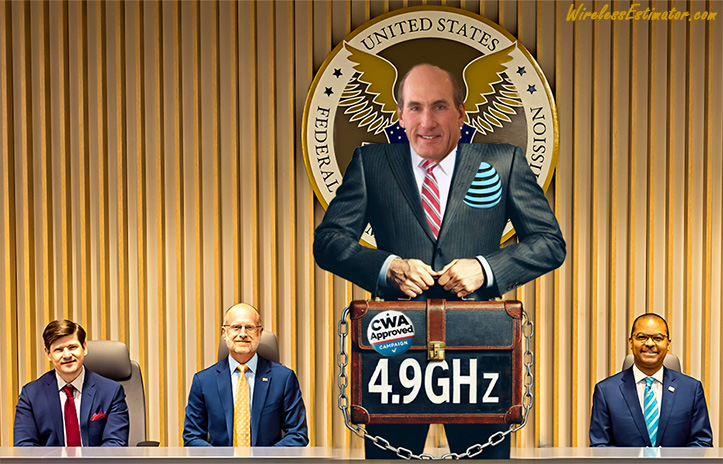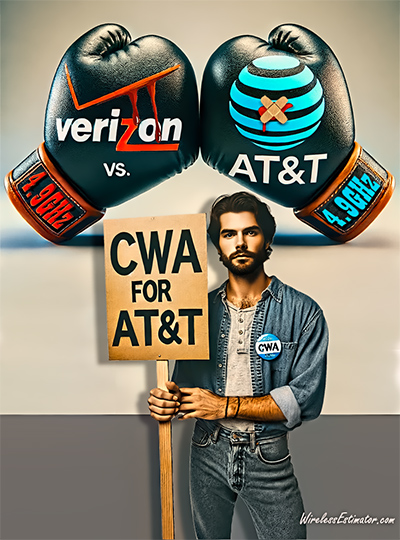
LOCK IT UP—AT&T CEO John Stankey wants to capture valuable 4.9 GHz spectrum for FirstNet and lobbied FCC Commissioners (from left) Nathan Simington, Brendan Carr, and Geoffrey Starks. The Communications Workers of America is backing Stankey’s initiative.
AT&T CEO John Stankey has entered the fray over allocating the valuable 4.9 GHz spectrum band, advocating for its exclusive use by FirstNet, the nationwide first responder network operated by AT&T. Stankey defended the proposal amid opposition from other major wireless carriers in a series of meetings last week with top Federal Communications Commission (FCC) officials.

The CWA represents approximately 30,000 Verizon workers and about 150,000 AT&T employees. However, in the battle for the 4.9 GHz spectrum, they’re ringside in AT&T’s corner.
Stankey met with FCC Commissioners Brendan Carr and Geoffrey Starks on July 31 and Nathan Simington on August 1. During these meetings, he emphasized the strong backing from public safety labor and management organizations for the FCC to facilitate FirstNet’s use of the 4.9 GHz band. According to an ex parte filing posted by AT&T on Friday, Stankey also disputed claims that the allocation would result in a multi-billion dollar windfall for AT&T.
Representing over 150,000 AT&T employees, the Communications Workers of America submitted a letter to the FCC on August 1, arguing that allocating the 4.9 GHz band to a single nationwide licensee, such as FirstNet, would enable rapid and efficient nationwide deployment, countering the slow and fragmented approach that has led to underutilization of the band over the past two decades.
CWA said it was “deeply invested in the success of FirstNet, which was built and is maintained by AT&T, the only wireless carrier with a union-represented workforce.”
Although CWA represents wireless carrier Verizon in their wireline business, the olive branch thrown to AT&T could be seen as a quid pro quo to move forward with a favorable bargaining agreement. Verizon handles the installation, maintenance, and repair of its wireline infrastructure, including fiber optic and copper networks. Approximately 30,000 workers are CWA members.
In a letter dated July 26, 2024, a group of U.S. Congress members called on Stankey to ensure fair and good-faith negotiations with AT&T employees engaged in crucial broadband deployment and support roles. The representatives emphasized the importance of reaching an equitable agreement that benefits both the employees and the company during their current contract negotiations.
The FCC initially reserved the 4.9 GHz band for local public safety use. In January 2023, the FCC proposed instituting a band manager to enhance utilization amid growing spectrum demand. The Public Safety Spectrum Alliance (PSSA), led by a former FirstNet vice chairman, suggested granting FirstNet a nationwide license to use the band for its network.
However, other wireless carriers, including Verizon and T-Mobile, have opposed this plan. They argue it would unfairly advantage AT&T, which can already use dormant FirstNet spectrum for commercial purposes under its contract. A study commissioned by these carriers valued the 4.9 GHz band at approximately $14 billion.
As reported by Wireless Estimator, Verizon has taken a firm stance against the PSSA proposal. In a filing with the FCC, Verizon’s Senior Vice President of Federal Regulatory & Legal Affairs, William H. Johnson, outlined the company’s opposition.
Verizon argues that assigning the 4.9 GHz band to FirstNet would disrupt the competitive landscape for public safety and commercial wireless services. They emphasize that there is no clear need to allocate another 50 megahertz to FirstNet, as AT&T already provides priority access to its FirstNet customers on existing bands.
Verizon also highlighted that the proposal would grant AT&T a significant financial windfall and create an unfair market advantage. They referenced a valuation by the Brattle Group estimating the 4.9 GHz spectrum’s worth at over $14 billion, arguing that granting this spectrum without a competitive process would undermine the competitive wireless marketplace and U.S. spectrum policy.
Verizon and the Coalition for Emergency Response and Critical Infrastructure (CERCI) have raised legal concerns regarding the FCC’s authority to allocate additional spectrum to FirstNet beyond Band 14. Additionally, recent reports from the U.S. Department of Commerce Office of Inspector General have cited significant compliance and oversight issues concerning FirstNet and AT&T.
















